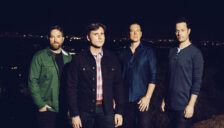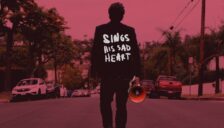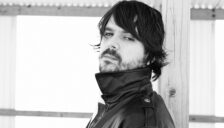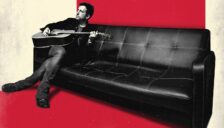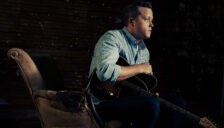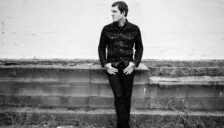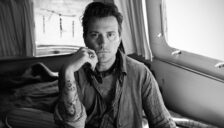A week out from the release of Jimmy Eat World’s 10th full-length studio album Surviving, I spoke with drummer Zach Lind about how the band makes albums now versus 10 or 20 years ago, working with producer Justin Meldal-Johnsen, crafting a setlist with 25 years of music to choose from, and ranking the band’s beloved discography.
Interview: Matt Nathanson Is the Most Nostalgic Guy in the Room
When Matt Nathanson started writing his new record, he had a vision. He wanted it to be political. He wanted it to be uplifting. He wanted to inspire his listeners to see a brighter future.
The songs that came out of him had other plans.
Sings His Sad Heart, the follow-up to Nathanson’s 2015 LP Show Me Your Fangs, is personal instead of political, sad instead of uplifting, and lost in thoughts about the past instead of looking forward to the future. It is a complete contradiction of the album that Nathanson wanted to make. And yet, it’s also the most at home he’s sounded on a record since 2010’s breezy Modern Love.
Then again, Nathanson has always been an artist defined by his contradictions. He’s a riotously funny and jovial live performer who makes crushingly sad records. He’s a guy who exudes confidence and charisma onstage but admits he isn’t very confident as an artist. And he’s a songwriter who’d name the happiest song on his record “Sadness.”
When I spoke to Nathanson in August, I called him “the most nostalgic guy in the room.” It’s a role I often find myself playing: the guy who digs through TimeHop every day and sends pictures and “remember this?” messages to old friends, or the guy who spends entirely too much time thinking about people he lost touch with, wondering if they ever think of him too.
Read More “Matt Nathanson Is the Most Nostalgic Guy in the Room”
Interview: Eight Years Down: Cary Brothers on His Long-Awaited Return
As listeners, we typically assume that a debut album is an artist’s mission statement. Simply put, an artist’s first album is supposed to establish what that person or band sounds like. It’s supposed to lay the foundations for the rest of their career and give listeners some idea of what to expect later on down the road. But what happens when a debut album proves to be an anomaly? When the first record establishes a sonic identity that the artist doesn’t want to chase on future releases?
For more than a decade now, Cary Brothers has been asking precisely that question.
Brothers burst onto the scene in 2004, with a December release called All the Rage. It wasn’t until the next year, though, that he got his big break, thanks in large part to the Garden State soundtrack. Brothers’ beloved contribution, the song “Blue Eyes,” had already been a Hotel Café favorite when Zach Braff scooped it up for his quirky coming-of-age dramedy. Garden State took the song and immortalized it for listeners and movie fans who were of a certain age at the time. While the song gave Brothers the kind of boost that just about any songwriter would kill for, though, it also meant that he got the musical version of typecast. “Blue Eyes” was a singer-songwriter song, and Brothers’ full-length debut, 2007’s Who You Are, was a singer-songwriter album. You could hardly blame early Cary Brothers fans for making the assumption that he was an acoustic singer-songwriter, period.
Read More “Eight Years Down: Cary Brothers on His Long-Awaited Return”
Interview: Noah Gundersen’s Restless Heart
In 2014, Noah Gundersen released his first full-length album. The record in question, Ledges, was a masterclass in contemporary folk music, loaded with confessional lyrics, acoustic guitars, and fiddles. By all accounts, Gundersen seemed like a traditionalist.
In 2015, Gundersen quickly followed Ledges up with his sophomore LP, the spiritually fraught Carry the Ghost. It was still a folk album, but Noah was fleshing things out, adding fractious electric guitar and other elements of full band instrumentation into the mix. It was clearly the work of a young songwriter who was yearning to grow.
Between the fall of 2015 and the early winter of 2016, Gundersen did two tours in support of Carry the Ghost. The first was a full-band endeavor, presenting the songs on Ghost as they were meant to be heard. The second was a solo tour, where Gundersen played songs from both Ledges and Carry the Ghost on acoustic guitar, solo electric guitar, and piano. It was a stark, intimate presentation, and it showed off what made Gundersen so special: his vulnerable, fragile voice; his songs that could work well no matter how much he built them up or stripped them down; and his honest, forthright lyrics.
But something was wrong. Gundersen was having a crisis of faith—not the same crisis of religious faith he wrote about on Carry the Ghost, but a crisis of faith in his own art. When I saw Gundersen on the solo tour for Ghost, he was pointedly reserved. He bantered with the audience occasionally, but during the songs, his eyes were cast toward the floor or closed entirely. And at the end of the show, when a condescending moderator led a Q&A session and suggested that Gundersen was “so young” and “couldn’t have possibly experienced what he sang about in his songs,” Noah seemed at a loss for how to answer—at least politely. When the Q&A ended, Gundersen headed quickly for the stage door.
Interview: Keep on Dreaming Even If It Breaks Your Heart: The Renaissance of Will Hoge
Will Hoge almost got the dream.
In 2015, the independent Nashville-based recording artist seemed poised to win the country music lottery. He and his band had been picked by a major radio conglomerate as a spotlight artist, to be introduced on a mass scale to radio listeners nationwide. Looking back now, Hoge says the slot was virtually a guarantee of a top 10 record in the country music sphere. “This is exactly what the program is for,” the radio group told him and his band: spotlighting new artists or independent acts and helping them find a home in the infamously commercialized world of country radio.
For Hoge, being picked as a next big thing was the realization of a long-held dream. He’d released his first record—as part of the band Spoonful—in 1997, before going solo with 2001’s Carousel. What followed was a series of well-liked and respected records that melded country, southern rock, and heartland rock into something that sounded like a twangier Springsteen. For 2003’s Blackbird on a Lonely Wire, Hoge got scooped up by Atlantic Records, but the album failed to take off and it was back to the independent musician game after that.
Still, Hoge kept trucking and was eventually rewarded for his persistence. In 2012, Eli Young Band recorded a version of “Even If It Breaks Your Heart,” a song from Hoge’s 2009 record The Wreckage. The song was the opening track and second single from Eli Young Band’s Life at Best album, and it ultimately reached number one on the Billboard country chart. Suddenly armed with a number one song to his name, Hoge landed his 2013 track “Strong” in a widely syndicated ad campaign for Chevrolet Silverado. The song charted modestly on country radio, but it was enough to convince Hoge that if he really tried to play the game, he might just be able to make some magic happen.
Read More “Keep on Dreaming Even If It Breaks Your Heart: The Renaissance of Will Hoge”
Interview: Andrew McMahon
Andrew McMahon in the Wilderness will release their sophomore LP, Zombies on Broadway, later this week. I spoke with McMahon on the phone about the new record’s pop-leaning direction, his ever-evolving sound, the way family has defined his last few albums, and whether or not he’d ever consider writing a memoir. We also spoke briefly about next year’s 10-year anniversary of Jack’s Mannequin’s The Glass Passenger and whether or not fans can expect any special tours or reissues to mark the occasion.
Interview: Frank Turner
Frank Turner is about to return to the United States for another leg of the Positive Songs for Negative People tour. I got a chance to chat with Frank about how he feels about the album now that it’s been out for a little while, why his next record will be more “radical” and “experimental” than anything he’s ever done before, how Butch Walker ended up producing the album, why playing shows with Jason Isbell is a realization of a years-old dream, and how recording the mournful “Song for Josh” in a live setting almost made Turner, a “profoundly, sternly atheist man,” glimpse a higher power.
Interview: Jason Isbell
I had a chance to chat on the phone with Americana star, Jason Isbell, about his album release, Something More Than Free. We talked about his philosophy on songwriting, the challenge of following up his magnum opus (2013’s Southeastern), the prospect of him becoming a father, his opinion on why women make better artists than men, the role producer Dave Cobb plays in creating his records, and the idea of blending fiction and non-fiction for songs that always strike a chord.
Interview: Matt Nathanson
I got to speak on the phone with the ever-amusing and ultra-talented Matt Nathanson. In our interview, Nathanson described the disjointed but ultimately satisfying nature of his brand new album, Show Me Your Fangs. We also discussed the unpredictable audience-request format of Nathanson’s current tour, how some of the best records have “great topography” instead of being thematically or musically cohesive, and how elements of hip-hop and R&B have slowly crept into Nathanson’s singer/songwriter-oriented music.
Interview: Brian Fallon
I recently had the chance to sit down and chat on the phone with the great Brian Fallon. The interview runs a range of topics, including the inspiration behind Fallon’s folk-heavy new solo album Painkillers (due March 11th), working with Butch Walker, the uncertain future of The Gaslight Anthem, favorite Springsteen songs, and the intriguing possibility of an Elsie: Part II.
Read More “Brian Fallon”
Interview: Noah Gundersen
Last week, I got the chance to spend a half hour chatting with Seattle-based folk singer/songwriter, Noah Gundersen. Fresh off the release of his 2014 debut album, Ledges, and already gearing up for the release of the follow-up, Carry the Ghost, Gundersen spoke candidly about the collaborative nature of his new album, about keeping the intimacy of his earlier music alive whilst moving into full-band territory, about exploring difficult subjects like religion and existentialism in his lyrics, and about why we’ll probably be hearing yet another new album from him sooner rather than later.
Interview: Butch Walker
Last week, I got a chance to chat extensively with a personal hero of mine, Butch Walker. We talked about Butch’s new album, Afraid of Ghosts, including how the recent loss of his father inspired a new direction for his music, why he decided to have Ryan Adams produce the disc, and why his trademark sarcasm and upbeat songwriting is nowhere to be found. We also touched upon Walker’s back catalog, the woeful reasons why no one should be expecting to find Letters on vinyl anytime soon, whether or not The Black Widows will be making music again in the future, and why Butch’s protege Jake Sinclair took over most of the production duties on the new Fall Out Boy LP.

